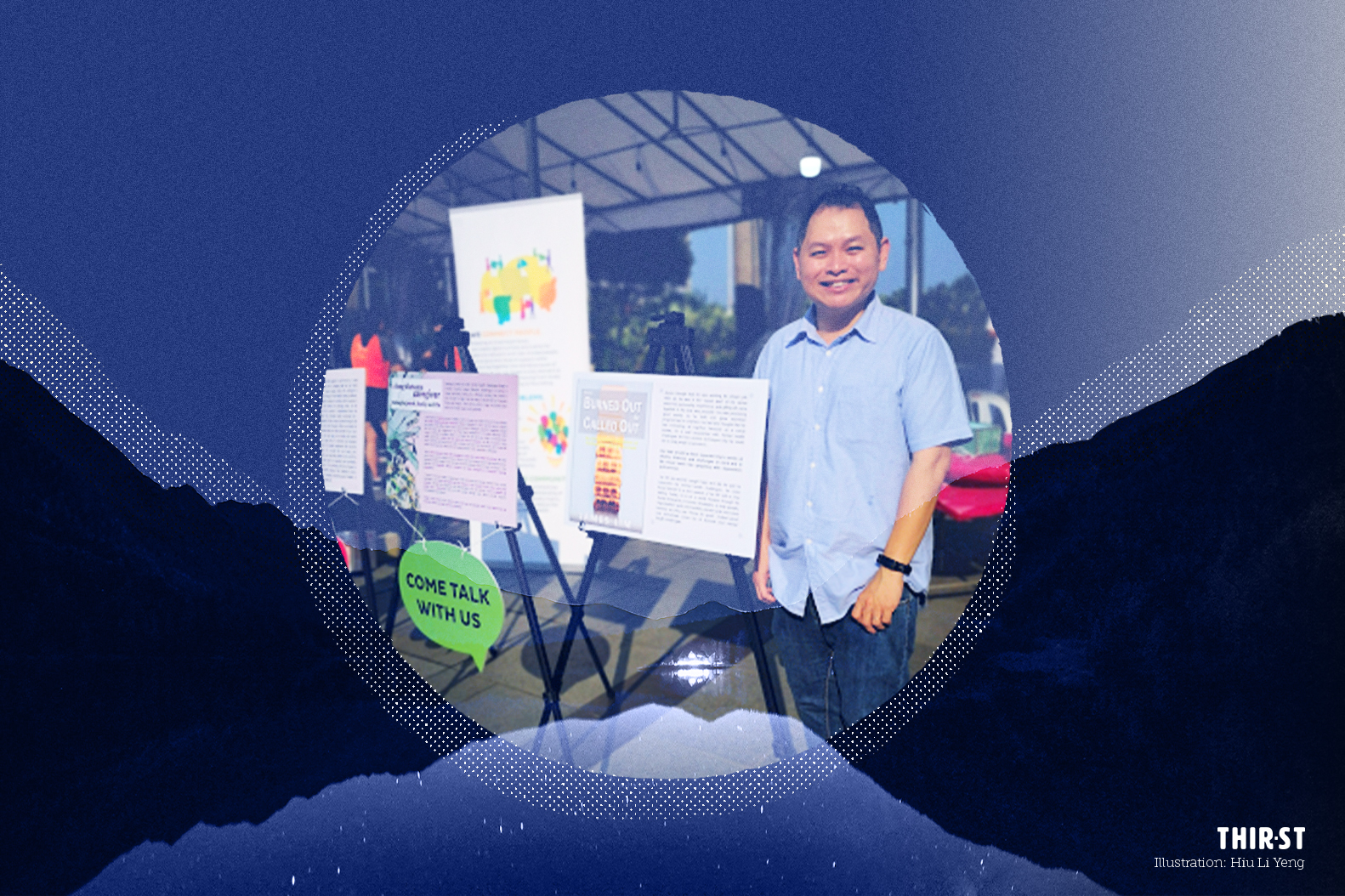In 2017, I made the difficult decision to leave a job I loved, to deal with my burnout and take care of my mental health.
I was trained as a social worker and had worked with various charities for more than 15 years, helping them to establish and grow their volunteer programmes.
Volunteer management was not something I had in mind when I began my career as a social worker, but it was something God called me to when He brought me back to Him after 15 years of straying away from Him.
Serving as a volunteer coordinator in The Salvation Army, I continued to use my gifting, skills and experience in volunteer management in other non-profits between 2005 and 2017.
I was working in a role that I had great passion in – I thought I would be serving in this area for the rest of my life!
So burning out was the last thing I expected to happen to me.

But my typical work day then was characterised by excessive multi-tasking.
Working on multiple projects, I would cross out some 20-30 items on my to-do list on a daily basis.
While it gave me great satisfaction to know that I was getting things done, my body started to exhibit some tell-tale signs of burnout. For instance, I was hospitalised twice in a month for pneumonia. Burnout literally took my breath away.
My colleague jokingly remarked at the time that I might be overworked. Even though the comment was made in a moment of jest, it got me thinking. That was the first time I realised I might indeed be burned out.
I knew I needed to do something about it, but I did not know what or how I could do something about it.
I previously suffered from depression and my symptoms were somewhat similar. Every morning began with a sense of dread at the overwhelming day ahead, and I would feel:
- Inadequate
- Easily agitated
- Cynical of others
- Perpetually exhausted (physically and mentally)
- Like I just wanted to withdraw from social interactions
Classic burnout. I knew I needed to do something about it, but I did not know what or how I could do something about it.
I felt trapped. Sometimes, I was even angry with myself for having allowed my life to come to such a state.
Finally, I made the decision to take a break from work.
Allowing my body and mind to recuperate would be the start of a personal learning journey in overcoming burnout.
In the early stages of this journey, I came to realise that there’s a lot of well-meaning “advice” out there on how to deal with burnout.
But I was left none the wiser because such “advice” never gave me any specific handles on how I could start overcoming burnout and prevent future episodes.
So, I started to look to God and the Bible for more answers.
Little did I expect, God would bring me through an ongoing journey of recovery and growth – just as He did with Elijah – and start to teach me about “restedness” in Him.
I started to see how Scripture made so much sense in helping us live life “to the full” (John 10:10), and how burnout could be the enemy’s way of stealing, killing and destroying as he robs and derails us from a thriving life in Christ.
That year, I learned many valuable lessons from God and my battle with burnout.
I started to make greater sense of these lessons as I reflected on my journey thus far in social work. I also gleaned much from my spiritual walk, self-discovery and time spent studying the topic of overcoming burnout.
I met up with friends and fellow brothers and sisters-in-Christ, and we journeyed together and talked about what God is doing in our lives. I experimented with designing a routine for my life and made tweaks. I exercised self-control over my thoughts.
And I made intentional decisions to rest, connecting with God and my loved ones as I continued to seek help from mental health professionals.
And when I served my notice and sought God about the next steps, I realised that I had a burden for mental well-being.

Starting a social enterprise was not something I envisioned myself doing, but I found myself slowly putting together the plans for Emmaus Strategies as God led me into a new season.
I chose Emmaus for the name of my social enterprise because I encountered it during quiet time and loved what it meant. Emmaus is a town mentioned in the Bible. And it was on the road to Emmaus that Jesus appeared to His two disciples after He was crucified.
Without them knowing, Jesus journeyed with them. Jesus heartened two brokenhearted men who went from dejected and confused, to delighted and clearheaded.
Emmaus is thus symbolic of a journey that fuels people up for good.
God is using my life experiences in overcoming depression and burnout to help others.
At Emmaus, we’re seeking to go beyond stress management. We’re more interested in helping people build mental resilience in themselves and the organisations they work in.
We do this through talks, workshops and retreats to help people understand what burnout is. We take them on a learning journey to see how they can grow so as to prevent or overcome burnout.
Ultimately, we hope to be able to renew minds in Christ.

If you’re feeling burnt out in your studies, work or ministry, or as a caregiver or parent, there are a few things you can start to do.
First, look at your life. See if you’re in a sustainable rhythm or pace of life. Our God is a God of order and He has also reminded us of the importance of rest amidst our work (Genesis 2:2-3, Matthew 11:28-30).
Do you have a specific cut-off time for work? Do you limit your screen time?
What about the thoughts that run through your mind? Do they reflect how God sees us, or is it filled with accusations and condemnation that seek to tear us down?
Do you make a conscious effort to ask God to renew your mind? Do you listen to and read His Word as you strive to”take captive of every thought to make it obedient to Christ” (2 Corinthians 10:5)?
And how about your relationships with God and your loved ones? How well fed or starved are they?
If you’re overwhelmed or need help, it’s always a wise choice to journey with someone and allow them to support you (Ecclesiastes 4:9-12).
Approach a mental health professional or speak to a fellow brother- or sister-in-Christ. There’s also your cell group leader, pastoral staff and your pastor.
You’re never alone.
- What does burnout or depression mean to you?
- Have you ever felt those symptoms described by James?
- Who would be in your circle of support?
- Know of someone facing stress? Encourage them this week.









